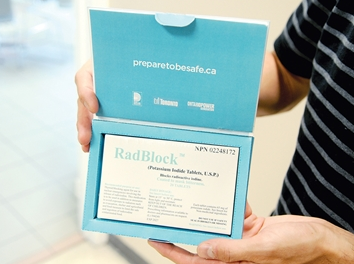Potassium iodide (KI) pills

Quick facts
- Potassium iodide (KI) is a salt of non-radioactive iodine.
- KI only protects the thyroid gland from radioactive iodine; it is not effective against any other nuclear substance.
- Do not take KI pills unless you are instructed to do so by public health officials.
- During a nuclear emergency, you will be promptly notified by radio, television, Internet, sirens, automated phone calls and social media.
- KI saturates your thyroid gland, preventing radioactive iodine from being absorbed; over time, the radioactive iodine will decay and be harmlessly excreted in urine.
- The overall benefit of taking KI during an emergency outweighs the risk of side effects.
- KI pills are effective for up to 12 years if they are stored in a dry location between 15 and 30 degrees Celsius.
What to do in the unlikely event of a nuclear emergency
- Go inside and turn on your radio and/or television for instructions
- Listen to media reports
- Follow instructions provided by government officials
- Follow the proper steps for evacuation, shelter-in-place, taking KI, and reporting to a reception centre for evaluation and/or monitoring.
What is KI?
Potassium iodide (KI) can be used to protect the thyroid gland from radioactive iodine that may be released into the air in the unlikely event of a radiological emergency. In very small quantities, it is an essential nutrient for your thyroid gland to function properly. In the event of a nuclear emergency, KI is effective in reducing the threat of thyroid cancer to residents at risk of inhaling or ingesting radioactive iodine. It comes in easy to swallow tablet form.
KI only protects the thyroid gland from radioactive iodine; it is not effective against any other nuclear substance. Depending on the nature of the emergency, KI is a protective measure that can be used in isolation or in combination with other protective measures (i.e., evacuation, shelter-in-place)
How does it work?
The thyroid gland will absorb iodine that is in a person's bloodstream; it cannot tell the difference between radioactive iodine and non-radioactive (stable) iodine. The absorption of radioactive iodine can be prevented by taking KI before or soon after its release into the air. Taking KI will saturate the thyroid gland so that there is no space left for the radioactive iodine to be absorbed. Over time, the radioactive iodine will undergo radioactive decay and be harmlessly excreted in urine.
When should it be taken?
Not all radiological emergencies involve radioactive iodine, and KI is only required when there are significant amounts of radioactive iodine present. KI should only be taken when directed by public health officials. It works best when it is taken immediately before or as soon as possible after exposure.
Are there side effects?
The risk of health side effects associated with taking KI is very low for all age groups with regular thyroid function. For people who have thyroid disorders (e.g., Graves' disease, iodine deficiency/sensitivity and auto-immune thyroiditis), there is an increased risk of side effects. People who face an increased risk of side effects should consult a doctor or nurse prior to taking KI. Overall, the benefit of taking the pill during a nuclear emergency far outweighs the risk of side effects.
KI distribution regulations in Canada
In Canada, the Canadian Nuclear Safety Commission (CNSC) has recently established a national standard for KI pill distribution. Nuclear power plant licensees are required to ensure that KI pills are pre-distributed to individuals living or working near a nuclear power plant. The Province of Ontario's Office of the Fire Marshal & Emergency Management (OFMEM) and the New Brunswick Emergency Management Organization (NBEMO) are working towards developing a strategy to fulfill these requirements.
| Province | Nuclear areas | Regulation strategy |
|---|---|---|
Ontario |
|
The Provincial Nuclear Emergency Response Plan (PNERP), currently under review, assigns responsibility to each municipality to detail in their plans their means of facilitating KI pill availability. It also requires the nuclear operator, Ontario Power Generation, Bruce Power and the Canadian Nuclear Laboratories (except for Amherstburg), to provide resources to their municipalities.
|
New Brunswick |
|
Since the initial start-up of the plant in 1982, KI pills have been provided to all residences within 20 km of the station, known as the longer-term protective zone (LPZ). This has now been extended to schools (Fundy Shores and Pennfield elementary schools). Residents receive an information pamphlet on KI pills that is distributed door to door. In addition to residences, there are several KI stockpile locations within 50 km of the nuclear generating station. |
Quebec |
|
There has also been a modification for the KI pill distribution regulations at the Gentilly-2 plant in Quebec. After evaluating radiological risk, Gentilly-2 no longer represents a risk to surrounding populations, following decommissioning projects that have taken place since 2013. This means that KI pills are not a requirement. In fact, previously eligible citizens are now encouraged to dispose of the KI pills that they have in stock. |
Doses
| Category | Dose |
|---|---|
| Pregnant or breastfeeding women | 2 tablets (1 single dose only) |
| Adults (18+) | 2 tablets every 24 hours |
| Children (3-18) | 1 tablet every 24 hours |
| Children (1 month – 3 years) | ½ tablet daily crushed in food or fluids |
| Children (under 1 month) | ¼ tablet dissolved in fluids (1 single dose only) |
Page details
- Date modified: